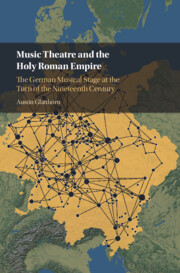 Music Theatre and the Holy Roman Empire
Music Theatre and the Holy Roman Empire Book contents
- Music Theatre and the Holy Roman Empire
- Music Theatre and the Holy Roman Empire
- Copyright page
- Dedication
- Contents
- Figures
- Tables
- Musical Examples
- Acknowledgements
- Note on the Text
- Abbreviations
- Introduction: Music for an Imperial Stage
- 1 An Empire of Theatres
- 2 (In)forming Repertoire
- 3 Letters from the German Stage
- 4 ‘Germany’s Daughter, Melodrama’
- 5 Staging Imperial Identity
- Epilogue: Echoes of an Empire
- Appendix 1: German Theatre Companies and Performance Locations Reported in the Theater-Kalender, c.1800
- Appendix 2: Music Theatre and Musicians Referenced in the Theater-Kalender, c.1800
- Glossary
- Bibliography
- Index
5 - Staging Imperial Identity
Published online by Cambridge University Press: 14 June 2022
- Music Theatre and the Holy Roman Empire
- Music Theatre and the Holy Roman Empire
- Copyright page
- Dedication
- Contents
- Figures
- Tables
- Musical Examples
- Acknowledgements
- Note on the Text
- Abbreviations
- Introduction: Music for an Imperial Stage
- 1 An Empire of Theatres
- 2 (In)forming Repertoire
- 3 Letters from the German Stage
- 4 ‘Germany’s Daughter, Melodrama’
- 5 Staging Imperial Identity
- Epilogue: Echoes of an Empire
- Appendix 1: German Theatre Companies and Performance Locations Reported in the Theater-Kalender, c.1800
- Appendix 2: Music Theatre and Musicians Referenced in the Theater-Kalender, c.1800
- Glossary
- Bibliography
- Index
Summary
The final chapter explores music theatre as a cultural expression of the Empire. Dramatists and composers responded to current events by creating works of varying genres for the Empire's stages. Focusing on Günther von Schwarzburg (Mannheim, 1777; German serious opera) by Ignaz Holzbauer (1711–83), Oberon, König der Elfen (Vienna, 1789; Singspiel) by Paul Wranitzky (1756–1808), Heinrich der Löwe (Frankfurt am Main, 1792; Singspiel) by Carl David Stegmann (1751–1826), Die Feier des achtzehnten Jahrhunderts (Leipzig, 1794; melodrama) by Siegfried Schmiedt (1756–99), the anonymous Der Retter Deutschlands (Vienna, 1797; melodrama), and Achille (Vienna, 1801; opera seria) by Ferdinando Paer (1771–1839), this chapter argues that music theatre portraying the Reich called for cooperation in uncertain times by appealing to a sense of belonging to both local Estate and the Empire. Studies of these works tend to view them as expressions of an emerging German nationalism. This chapter challenges such perceptions, arguing that although the Reich was not a nation-state, composers nevertheless portrayed it as a complex nation and state, placing its past, present, and future centre stage.
Keywords
- Type
- Chapter
- Information
- Music Theatre and the Holy Roman EmpireThe German Musical Stage at the Turn of the Nineteenth Century, pp. 218 - 266Publisher: Cambridge University PressPrint publication year: 2022
